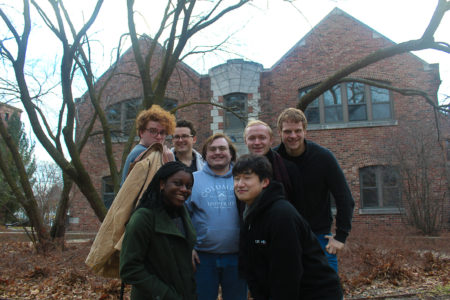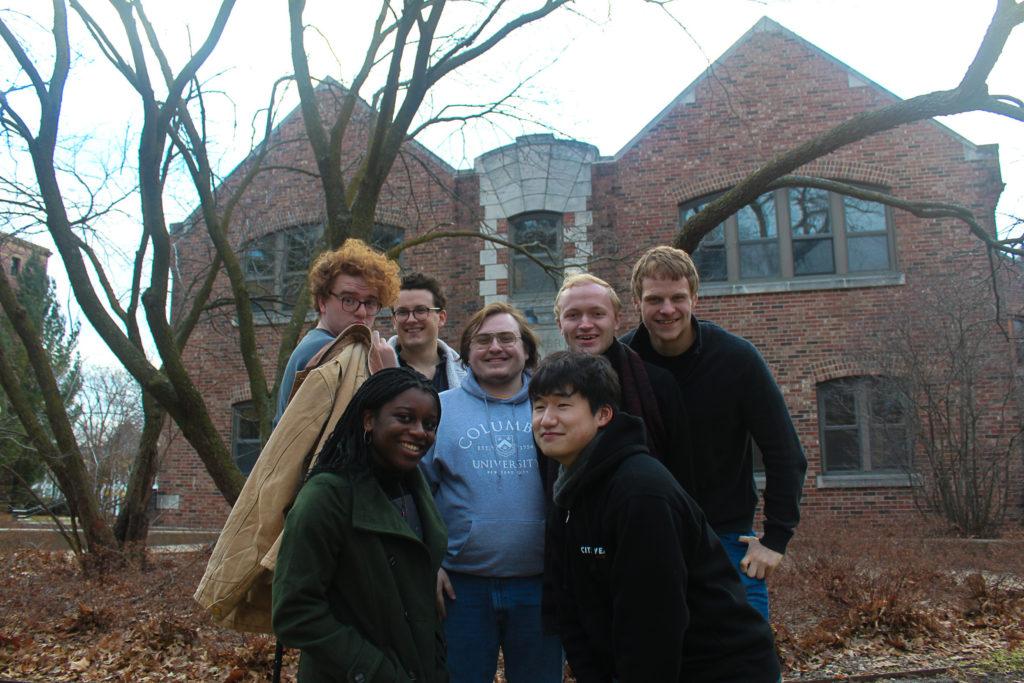
By Chloe Wray
wraychlo@grinnell.edu
When I met the philosophy student educational policy committee (SEPC), they were dressed in varying shades of grey, quite suited for a field of that is often thought of as morose. The quick humor of the group, however, was anything but dour — aside from the potential for surly jokes at the expense of the major, which highlighted a love for the department and discipline.
The philosophy SEPC comprises Patrick Armstrong ’18, Tristan Aschittino ’18, Vincent Benlloch ’18, Jin Chang ’19, Maxwell Fenton ’19, Candace Mettle ’19 and Max Pilcher ’18. Members of the SEPC act as student-faculty liaisons for the philosophy department, participate in tenure review procedures for faculty and interview new hires. Other roles include hosting and promoting events. The first such event of the semester is on Feb. 8, when the department is bringing Michael Olsen ’03 to present a talk called “Interrogating ‘Kant.’”
One “venerable” tradition, as Fenton put it, is the philosophy SEPC book club, which has been taking place on campus for several years. The most recent meeting featured an early article by Keeanga-Yamahtta Taylor on race and political economy and a selection by Gloria Anzaldúa on Mestiza identity, along with pancakes courtesy of Benlloch. The book club does not limit itself to seminal philosophical texts as these two selections might suggest — they cover everything from race to sexuality to disability studies, as well as literary classics like David Foster Wallace and Kafka.
Other roles of the SEPC involve encouraging department engagement. The SEPC highlighted two visiting professors in the philosophy department this semester, Mukasa Mubirumusoke and Jo-Jo Koo, who will be teaching Contemporary Ethical Issues and the Philosophy of Race and Gender, respectively.
On the subject of department involvement, the members of the SEPC were quick to share their reasons for practicing philosophy, much of which revolved around the insight philosophy offers into the shared human experience.
“[Philosophy is] a necessary component for everyone to think about their own choices and apply some reflexivity to the decisions they are making,” Pilcher said.
Aschittino offered similar thoughts on the relevance and usefulness of the philosophy major.
“Everyone has to go through life with a world view, and philosophy is a way to look at a huge number of world views and how they compete and alter each other and how they interact,” Aschittino said. “It maybe is the most practical major if you’re thinking of the practicality of being a human being in the world!”
“It’s something that is both deeply rigorous but also in many ways deeply personal,” Benlloch added. “I do think there are less majors that require a certain level of personal commitment to the way in which you figure into the things you read.”
Armstrong affirmed the personal dimension of studying philosophy as well.
“On the personal level, there’s also something about the practice itself that’s really thrilling and exciting,” Armstrong said. “I’ve never had the same feeling intellectually after reading as I have after reading really dense philosophy of any kind for eights hours straight. Particularly with really old or ancient philosophy you get into this really odd logic that you have to occupy with your brain and you have to make the arguments as they would. It feels like you’re occupying a different form of reality, in a really cool and rigorous way.”
Fenton was sure to emphasize the interdisciplinary nature of philosophy.
“You can apply different [lenses] of philosophy to contemporary philosophy to ethical issues, political issues, social issues … it’s very much the underpinnings of a lot of other disciplines. I don’t know if we’d have sociology or Gender, Women’s and Sexuality Studies, or empirical sciences, without philosophy providing a basis for them. It’s very much the structure of how contemporary thinking works,” Fenton said.
—Editor’s note: Maxwell Fenton ’19 is the opinions editor for The S&B and Candace Mettle ’19 is the news editor for The S&B



































































